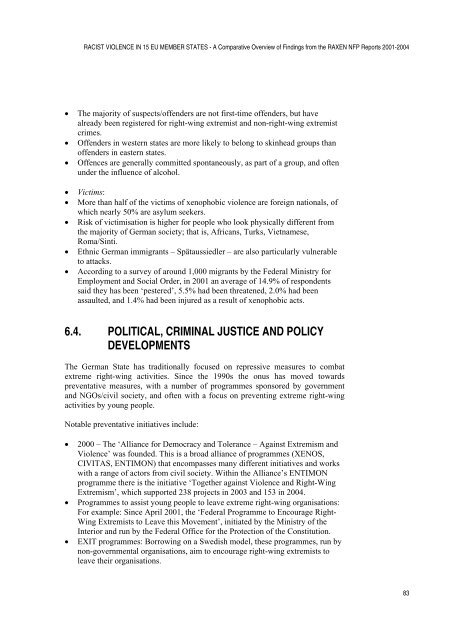RACIST VIOLENCE IN 15 EU MEMBER STATES - Cospe
RACIST VIOLENCE IN 15 EU MEMBER STATES - Cospe
RACIST VIOLENCE IN 15 EU MEMBER STATES - Cospe
You also want an ePaper? Increase the reach of your titles
YUMPU automatically turns print PDFs into web optimized ePapers that Google loves.
<strong>RACIST</strong> <strong>VIOLENCE</strong> <strong>IN</strong> <strong>15</strong> <strong>EU</strong> <strong>MEMBER</strong> <strong>STATES</strong> - A Comparative Overview of Findings from the RAXEN NFP Reports 2001-2004<br />
• The majority of suspects/offenders are not first-time offenders, but have<br />
already been registered for right-wing extremist and non-right-wing extremist<br />
crimes.<br />
• Offenders in western states are more likely to belong to skinhead groups than<br />
offenders in eastern states.<br />
• Offences are generally committed spontaneously, as part of a group, and often<br />
under the influence of alcohol.<br />
• Victims:<br />
• More than half of the victims of xenophobic violence are foreign nationals, of<br />
which nearly 50% are asylum seekers.<br />
• Risk of victimisation is higher for people who look physically different from<br />
the majority of German society; that is, Africans, Turks, Vietnamese,<br />
Roma/Sinti.<br />
• Ethnic German immigrants – Spätaussiedler – are also particularly vulnerable<br />
to attacks.<br />
• According to a survey of around 1,000 migrants by the Federal Ministry for<br />
Employment and Social Order, in 2001 an average of 14.9% of respondents<br />
said they has been ‘pestered’, 5.5% had been threatened, 2.0% had been<br />
assaulted, and 1.4% had been injured as a result of xenophobic acts.<br />
6.4. POLITICAL, CRIM<strong>IN</strong>AL JUSTICE AND POLICY<br />
DEVELOPMENTS<br />
The German State has traditionally focused on repressive measures to combat<br />
extreme right-wing activities. Since the 1990s the onus has moved towards<br />
preventative measures, with a number of programmes sponsored by government<br />
and NGOs/civil society, and often with a focus on preventing extreme right-wing<br />
activities by young people.<br />
Notable preventative initiatives include:<br />
• 2000 – The ‘Alliance for Democracy and Tolerance – Against Extremism and<br />
Violence’ was founded. This is a broad alliance of programmes (XENOS,<br />
CIVITAS, ENTIMON) that encompasses many different initiatives and works<br />
with a range of actors from civil society. Within the Alliance’s ENTIMON<br />
programme there is the initiative ‘Together against Violence and Right-Wing<br />
Extremism’, which supported 238 projects in 2003 and <strong>15</strong>3 in 2004.<br />
• Programmes to assist young people to leave extreme right-wing organisations:<br />
For example: Since April 2001, the ‘Federal Programme to Encourage Right-<br />
Wing Extremists to Leave this Movement’, initiated by the Ministry of the<br />
Interior and run by the Federal Office for the Protection of the Constitution.<br />
• EXIT programmes: Borrowing on a Swedish model, these programmes, run by<br />
non-governmental organisations, aim to encourage right-wing extremists to<br />
leave their organisations.<br />
83
















